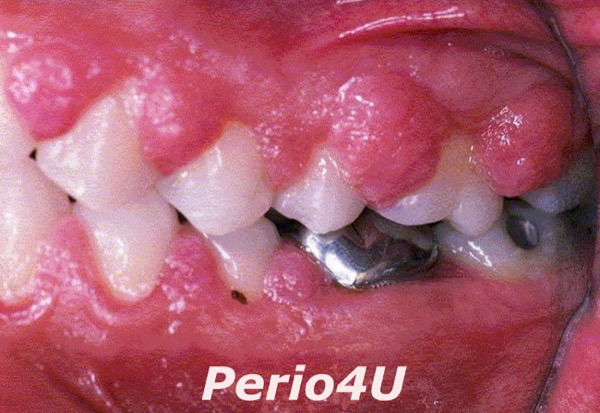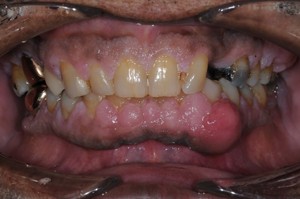


A case report of gingival overgrowth induced by nifedipine in a patient with good oral hygiene and its nonsurgical management with drug substitution is discussed in this case report. Although gingival inflammation is considered a primary requisite in their development, few cases with minimal or no plaque induced gingival inflammation have also been reported. Within the group of patients that develop this unwanted effect, there appears to be variability in the extent and severity of the gingival changes.

The frequency of gingival enlargement associated with chronic nifedipine therapy remains controversial. The awareness in the medical community about this possible side effect of nifedipine is less when compared to the effects of phenytoin and cyclosporin. As gingival enlargement develops, it affects the normal oral hygiene practice and may interfere with masticatory functions. If you struggle to feel confident in your smile, contact us at (904) 683-4781.Drug-induced gingival overgrowth is frequently associated with three particular drugs: phenytoin, cyclosporin, and nifedipine. Matthew Nawrocki understand the difficulties gum overgrowth can cause, which is why they offer periodontal and laser therapy and gum grafting to address the problem. At Jacksonville Dental Specialists, he and Dr. Aguila also possesses a master’s degree in health sciences and a certificate in periodontics. He then went on to attend the Naval Medical Center San Diego to complete a hospital-based General Practice Residency. Richard Aguila earned his Doctor of Dental Surgery degree from West Virginia University. Treating excess gum tissue will allow you to better manage your oral health and embrace a more aesthetically pleasing smile.ĭr. See your dentist for general checkups and cleanings.Find ways to lower your stress, as this is a common culprit of gum disease.Eat healthier foods that are rich in nutrients and vitamins while limiting your intake of sugars and starches.Maintain optimal oral hygiene by brushing, flossing, and rinsing regularly.Not to mention, you will heal faster and avoid potential reinfection. With laser therapy, they can quickly eliminate the overgrowth to create an even gum line without excessive bleeding or swelling. You can also ask your dentist about surgical options. Scaling and root planing is a safe and effective way to remove plaque and tartar and improve your gum health.
#GUM OVERGROWTH PROFESSIONAL#
If you notice you have symptoms associated with gum disease, seek professional treatment. Should the infection and inflammation enter the bloodstream, you can go on to experience everything from neurological disorders (i.e., dementia, Alzheimer’s), poor gut health, diabetes, kidney disease, respiratory illness, and cardiovascular disease. As a result, your teeth may become loose and even fall out, especially if your facial structure (the jawbone) begins to deteriorate. Over time, if gum disease develops and remains untreated, it can begin to destroy your pearly whites and bone. Systemic Health Conditions – Pregnancy, leukemia, and even HIV, lymphoma, vitamin deficiencies, diabetes, and anemia can lead to gingival hyperplasia.Īpart from the aesthetic imperfections gum overgrowth can cause, this excess tissue can be harmful to your teeth, gums, and jawbone.
#GUM OVERGROWTH HOW TO#
Genetics – Although there’s not much you can do to prevent gum overgrowth caused by genetics (hereditary gingival fibromatosis), you can at least take action to learn how to prevent worsening conditions as well as treat the problem.Medications – If you take certain medications to prevent seizures, manage heart conditions, or lower your body’s immune system activity, it can cause your gums to grow.If caught early on, your symptoms can dissipate but only if you practice good oral hygiene and see your dentist for regular cleanings. Gum Disease – When your gums appear red and inflamed, the tissue may begin to bleed when brushing or flossing.There are many causes of gum overgrowth, such as: Why Are My Gums Growing Over My Teeth?Īlso known as gingival hyperplasia, gum overgrowth is a condition that causes the soft tissues surrounding your teeth to cover much of the natural tooth structure. If you are looking to learn more about why this problem occurs and what you can do to treat it, a local periodontist is here to shed light on the topic, so you can make the right decision about your oral health. While it might seem a purely aesthetic issue, gum overgrowth can lead to a higher risk of periodontal disease and tooth decay.


 0 kommentar(er)
0 kommentar(er)
